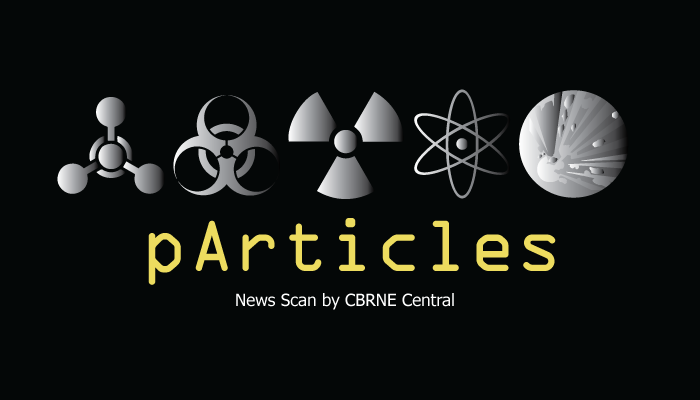Topics in this issue of CBRNE Particles include the Islamic State’s use of chemical weapons, post-exposure radiation drugs, and thermostable ricin vaccines.
In This Article
U.S. Confirms Islamic State Use of Chemical Weapons
U.S. military officials in Iraq have issued preliminary confirmation that Islamic State militants used mustard gas in a mortar attack on Kurdish forces in August. The attack occurred in the town of Makhmour in northern Iraq near the front lines of the Kurdish forces’ fight against the Islamic State, according to Killea, who briefed reporters at the Pentagon on Friday. Military Times >>
NIAID Exercises Option on Thermostable Ricin Vaccine Contract
The objectives of the contract are to advance the development of Soligenix’s thermostabilization technology, ThermoVax, combined with the company’s ricin toxin vaccine, RiVax, as a medical countermeasure to prevent the effects of ricin exposure. Global Biodefense >>
Secretive Fusion Company Claims Reactor Breakthrough
In a suburban industrial park south of Los Angeles, researchers have taken a significant step toward mastering nuclear fusion—a process that could provide abundant, cheap, and clean energy. A privately funded company called Tri Alpha Energy has built a machine that forms a ball of superheated gas—at about 10 million degrees Celsius—and holds it steady for 5 milliseconds without decaying away. Science >>
Radiation Drug Effective Administered 24 Hours After Exposure
A research team led by The University of Texas Medical Branch at Galveston reports a new breakthrough in countering the deadly effects of radiation exposure. A single injection of a regenerative peptide was shown to significantly increase survival in mice when given 24 hours after nuclear radiation exposure. Global Biodefense >>
UN Watchdog Makes Pitch for Money to Fund Iran Deal
The international nuclear watchdog tasked with overseeing new limits on Iran’s nuclear power is telling its member countries that it needs an extra $10.5 million per year in order to carry out the agreement. International Atomic Energy Agency (IAEA) Director General Yukiya Amano told his board of governors of Tuesday that he was not planning any budget offsets to make up for that cost, meaning that all the new money will need to be contributed from member countries. The Hill >>
Medical Countermeasure Planning: An Introduction
Planning the response to a large-scale biological incident requires a considerable amount of coordination. The initial response will include steps such as identifying the agent, determining the extent of spread, and coordinating with the media to notify the public. As these tasks are accomplished, priorities must then shift to prophylaxis for those who were potentially exposed and treatment for individuals who were exposed and are now displaying symptoms. CBRNe Portal >>
Pentagon Displeased with Iran Missile Sale
Iranian Defense Minister Brig. Gen. Hossein Dehghan on Tuesday said an agreement has been reached with Russia that will allow his country to receive the S-300 long-range surface-to-air missile systems by the end of the year, according to local reports. The Pentagon gave a frosty reception to the emerging deal between Iran and Russia for missile systems. “We don’t see this as a positive development,” Pentagon press secretary Peter Cook said at a press briefing. The Hill >>
Questioning the Case for New Nuclear Weapons
Recent developments—Russian aggression in Ukraine, China’s expanding territorial claims, and the need to modernize the US nuclear arsenal—have caused scholars to revisit a labyrinthine world of nuclear strategy largely neglected since the end of the Cold War. But this new wave of theory has resurrected some dubious arguments. Bulletin of the Atomic Scientists >>
Number One Priority: Nuclear Deterrence
What do you do when the nation’s senior-most military figure says that today’s global security environment “is the most unpredictable” he has seen in his 40 years of service? The first thing you should do is listen up. The second thing you should do is ask “why?” and “what should we do?” Real Clear Defense >>
20th CBRNE Participates in Ulchi Freedom Guardian
One of two Korean Peninsula-wide exercises, Ulchi Freedom Guardian is being conducting to keep alliance military forces ready to maintain security on the Korean Peninsula and stability in Northeast Asia. The 20th CBRNE Command is serving with Eighth Army, the U.S. Army’s top operational command in South Korea, and the Fort Carson, Colorado-based 71st Explosive Ordnance Disposal (EOD) Group is training with the 2nd Infantry Division, the U.S. Army’s only permanently forward deployed combat division. Stripes Korea >>
Lock Down of Nuclear Site: False Alarm, with a Lesson Learned
Last week the Savannah River Site in South Carolina, a large nuclear facility owned by the U.S. Department of Energy, went into a lock down after electronic and canine scans of a commercial delivery truck attempting to enter the facility indicated possible explosive residue on the vehicle. Inside Government Contracts >>
Europe Doesn’t Share U.S. Concerns on Iran Deal
Given the sound, fury and millions of dollars swirling around the debate in Washington over the Iranian nuclear deal, the silence in Europe is striking. It’s particularly noticeable in Britain, France and Germany, which were among the seven countries that signed the deal on July 14. NY Times >>



